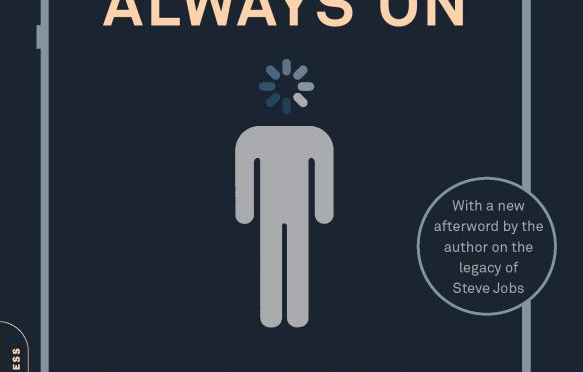Book Review: “Always On”
It’s been a while since my last book review, but that doesn’t mean I’ve not been keeping up to date with my reading list – if anything the list is getting longer (and the days shorter).
 My latest addition to the list is from Brian Chen – “Always On: How the iPhone Unlocked the Anything-Anytime-Anywhere Future – and Locked Us In“.
My latest addition to the list is from Brian Chen – “Always On: How the iPhone Unlocked the Anything-Anytime-Anywhere Future – and Locked Us In“.
It is clear to see all around us just what impact smartphones have had on society and, in my area of interest, learning. It has enabled truly mobile learning to take place – in the sense of mobile materials as well as mobile individuals – as well as interactions when we, the learner, wants it, not just when the course director wants it. Apple has taken something, developed it, marketed it, and let it loose on the world. You could argue about Apple and Steve Jobs’ intent and whether they knew what they had when it was first released, but it is the inclusion of the App Store and the developments the global community made that have helped steer and mould the direction the iPhone and subsequent smartphones took.
“The iPhone unlocked a reality in which we can potentially have anything we want, anytime and anywhere. And as a result, everything has changed – from how people interact socially to how students learn in classrooms, and from how we do our jobs to how companies make products.”
With chapters like ‘Smarter or Dumber?’, ‘Disconnected’, and ‘iSpy: The End of Privacy’ this book is a comprehensive look at not only the technology but our own willingness to embrace it and include it in all aspects of our daily activities.
“There is part of our digital lives that we can’t hack around, no matter how hard we try. As always-on participants, we trust that for-profit companies will use out data responsibly and ethically, and there is close to zero regulation over what businesses are allowed to do with our personal information. What are Microsoft or Google going to do, for example, with all these photos people posted everywhere? What if your photo showed up in a series of advertisements, or what if you were caught doing something somewhat sketchy and it made its way to a blog? And who is to say that smaller, seemingly innocent private companies won’t sell our information to larger groups, such as health insurance companies or marketing organizations?”
There is something for everyone in this book, and plenty to take away when looking at education, students, learning, and the always-on mentality of how we use the devices we own. With stories and anecdotes about games being developed in bedrooms that earn the developers thousands, if not millions, of dollars, to inspiring tales of bravery or survival, the iPhone and associated apps have made the device and the always-on mentality so integral to all parts of our lives and daily routines.
“Wolley’s incident [‘Dan Wolley: Buried in Haiti rubble’] highlights an incredible social implication of the iPhone and other similar smartphones: an Internet-enabled device, with access to a wealth of apps offering a multitude of utilities, can potentially transform a person into an always-connected, all-knowing being. In Wolley’s case, an iPhone app turned him into an amateur medic that helped him survive a natural disaster.”
With learning and teaching being represented throughout the book there are some simple, yet effective, examples of how the smartphone revolution is having, or should be having, an affect on classrooms and how we use them, view them, and ensure they are used as an advantage, not distraction:
“If we can access any information anytime, anywhere in the world with a smartphone, then the way we learn in a classroom is due for an upgrade. Young, bright students (and, heck, the dimwitted ones too) are fully aware that the Internet opens a portal to a live stream of information that billions of minds crowdsource.”
All in all this is good book – heavy on the concentration on the iPhone itself (but then it’s expected as the book is about the iPhone, and the author writes for Wired on Apple products and news) but there is plenty here for me about the general trend of how mobile devices is having, and has had, an impact on modern cultures.



















3 thoughts on “Book Review: “Always On””
Comments are closed.